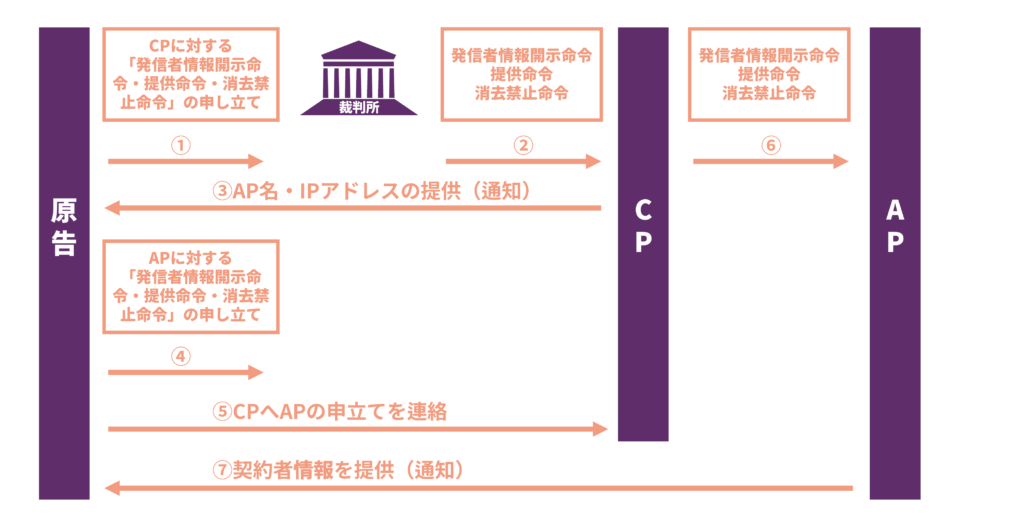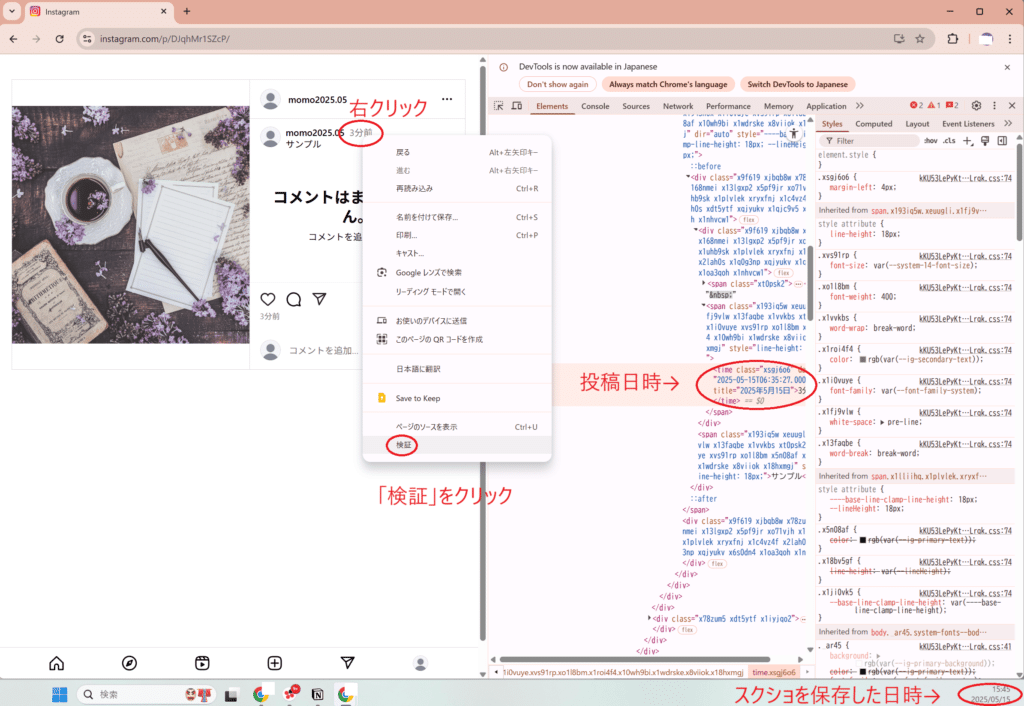How to Preserve Evidence of Defamation on Instagram? Explaining Methods to Save Admissible Evidence for Court Use

With the proliferation of social media, the issue of human rights violations through online posts continues unabated.
Following the amendment of the “Provider Liability Limitation Law” in Reiwa 4 (2022), now known as the “Information Distribution Platform Measures Law,” the system has been revised to facilitate victim relief more smoothly. This includes the establishment of new legal proceedings (non-contentious proceedings) for “disclosure requests of sender information,” leading to an increase in individuals seeking damages.
To take legal action against online human rights violations, “evidence” is essential. Even if you capture screenshots as evidence, without sufficient “evidentiary weight,” it becomes challenging to pursue legal measures such as requests for the disclosure of sender information.
In this article, an attorney will explain the key points of evidence preservation that meet the requirements of “judicial evidence,” focusing on Instagram, which is considered difficult to preserve evidence on within social media platforms.
How to Handle Defamation on Instagram Under Japanese Law
There are several primary methods to address defamation and similar issues on Instagram, which include:
- Requesting the identification of the poster from the operating company (disclosure request of sender information) and asking for the removal of the problematic post
- Filing a complaint with the police and seeking criminal penalties
- Consulting with an attorney about legal measures and requesting a claim for damages
In any case, given that the retention period for logs on social media platforms like Instagram is approximately three months, and that defamation and insult are complaint-based offenses with a short filing period (within six months from the identification of the offender), a swift response is required.
Legal Requirements for Disclosure Requests of Sender Information Under Japanese Law

This article will explain the requirements for “disclosure requests of sender information” as stipulated in Article 5 of the “Act on the Provision of Information Distribution Platforms” (official name: “Act on the Provision of Information Distribution Platforms by Specific Telecommunications”), which is a key component of Japanese IT/Internet law.
Clarity of Rights Infringement
The term “clear” in the context of rights infringement means that the act of tort has been established (meets the constitutive requirements) and there are no grounds to prevent it.
Prior to the amendment, the judgment depended on the discretion of the provider and was interpreted strictly, leading to a passive response. However, after the amendment, it is now objectively interpreted by the courts through non-contentious proceedings, and if there is a legitimate reason, it is more likely to be recognized.
Below, we will explain the types of defamation, which are considered to be among the most common rights infringements, and their requirements.
- Privacy Infringement
Acts that expose private life information without the person’s consent infringe on the personality rights under Article 13 of the Constitution and incur tort liability under Article 709 of the Civil Code.
- Crime of Defamation
Any person who publicly presents facts and damages the honor of another person shall be punished with imprisonment for not more than three years or a fine of not more than five hundred thousand yen, regardless of whether the facts are true or false.
Any person who defames the honor of the deceased shall not be punished unless it is done by presenting false facts.
(Penal Code Article 230, Paragraphs 1 and 2)
“Publicly” refers to posts on social media or bulletin boards on websites that are accessible to an unspecified large number of people and have the potential to spread, rather than DMs or personal interactions.
“Presenting facts, regardless of their truth,” means to specifically indicate facts that are dishonorable, whether they are true or false.
Defamation refers to acts that lower a person’s social evaluation.
When requesting the disclosure of sender information due to a defamatory post, it is necessary to argue and prove that the post constitutes a tort (Civil Code Article 709) and that defenses of truthfulness, such as the post being untrue or not concerning a matter of public interest, do not apply. (Supreme Court decision on June 23, 1966 (Showa 41))
- Crime of Insult
Any person who publicly insults another person without presenting facts shall be punished with imprisonment for not more than one year or a fine of not more than three hundred thousand yen or detention or a petty fine.
(Penal Code Article 231)
- Crimes of Credit Defamation and Obstruction of Business
Any person who spreads false rumors or uses deceit to damage the credit of another person or obstruct their business shall be punished with imprisonment for not more than three years or a fine of not more than five hundred thousand yen.
(Penal Code Article 233)
“Credit” refers to the “social credit” of an individual or corporation, which is their social evaluation in the economic aspect. Spreading false information or engaging in acts that lower this credit and hinder professional business activities is what this entails.
Justifiable Reasons (Proof of Necessity)
In order to pursue civil liabilities (such as damages, post deletion, and injunction requests) or criminal responsibilities for rights infringement, it is essential to have justifiable reasons for requesting the disclosure of sender information.
Identifying Infringing Information
For a request to disclose sender information, the following ‘infringing information’ with evidentiary power is necessary:
- Content of defamatory posts
- Time and date of the post (HTML source)
- URL
- Account name
We will explain the key points of evidence preservation on Instagram later on.
Proper Procedures
In Japan, a “Disclosure Request for Sender Information” must comply with the provider’s rules, and because it is difficult to obtain voluntary compliance, it is necessary to go through non-contentious proceedings in the court with jurisdiction over the defendant’s (provider’s) address.
In the case of Instagram, it is necessary to file a petition with the Tokyo District Court, which has international jurisdiction, or the district court of the victim’s address. Due to document handling and practical considerations on Instagram’s side, attorneys generally choose the Tokyo District Court.
Since Instagram (Meta Company) does not have a Japanese corporation (branch) in Japan, the defendant’s address will be listed as either the California address of the U.S. headquarters or the address of the Irish corporation.
Normally, communication is with the Irish corporation (Meta Platforms Ireland Limited) that manages the data, requiring the creation and delivery of documents in English.
The flow of non-contentious proceedings for a disclosure request for sender information is as shown in the diagram below.
Once the Content Provider (CP, in this article Meta Company) provides the name and address of the Access Provider (AP, think of carriers like NTT or Softbank) = Internet Service Provider (ISP), it is necessary to file a “Disclosure Order Petition” to the AP along with a “Prohibition of Erasure Order Petition” and notify the CP accordingly.

Reference: Ministry of Internal Affairs and Communications, “Creation of Three Orders by the Court“
Requirements for Requesting “Specific Sender Information” Under Japanese Law
We will explain the types of legally defined “sender information” that can be disclosed and the requirements for “specific sender information.” There are 14 types of items classified as “sender information,” and when disclosing, it is necessary that they fall under these items.
[Sender Information]- Name
- Address
- Telephone number
- Email address
- IP address and port number at the time of posting
- Internet service user identification code (ID) at the time of posting
- SIM identification number related to the transmission of the post (infringing information)
- Date and time (timestamp) when the post (infringing information) was transmitted
- IP address and port number at the time of login
- Internet service user identification code (ID) at the time of login
- SIM identification number at the time of login
- SMS telephone number at the time of login
- Date and time at the time of login
- Usage management code between providers
Out of the 14 items, items 9 to 13 are considered “specific sender information.” To request the disclosure of “specific sender information,” in addition to the above requirements, one of the following conditions must be met (as per the same regulation, Article 3):
- When the provider does not possess any “sender information” other than the “specific sender information.”
- When the provider does possess “sender information” other than the “specific sender information,” but it alone is not sufficient to identify the sender.
- When the sender cannot be identified with the “sender information” other than the “specific sender information” that has been disclosed.
Key Points for Preserving Instagram Evidence Under Japanese Law
Even if you encounter an infringement of rights on the internet, without evidence or ‘evidentiary power,’ there is a risk that you will not be able to identify the sender through a disclosure request for sender information, making it difficult to take measures such as claiming damages.
As previously mentioned, the log retention period is short, at three months, so prompt action is required.
In this article, we will explain the key points for preserving evidence on Instagram, which is considered difficult to preserve as ‘evidence in court,’ to meet the requirements of judicial evidence.
For a disclosure request for sender information, the following ‘infringing information’ is necessary as evidence:
- Content of the defamatory post
- Posting date and time (HTML source)
- URL
- Account name
Reference: Tokyo District Court ‘Order for Disclosure of Sender Information Application Format‘
Normally, infringing information is preserved by taking a screenshot of the screen, but it is crucial to include the date and time of the PC on which the screenshot was taken.
Below, we provide the procedure and a sample screenshot (in court, they are printed on two separate sheets for submission as evidence).
Method for Preserving Instagram Posts (When Disclosing IP Address)
1: Open your computer and launch Instagram in Google Chrome.
2: Right-click on the posting date next to the account name (where it says ‘● days ago’).
3: Click ‘Inspect’ at the bottom of the menu that appears to display the HTML source of the posting date and time only.
4: In the HTML source, find the part that says:
<time class=”x1p4m5qa” datetime=”2024-10-10T10:00:50.000Z” title=”2024年10月10日”>1 day ago</time>
This is the time the post was made, but it is not displayed on the visible screen. It appears selected when you right-click and click ‘Inspect.’ Create a screenshot that clearly shows the posting time from this source part.
However, the source is written in Coordinated Universal Time (Z), so you need to add +9 hours to the indicated time to convert it to Japan Standard Time.

Conclusion: Consult an Attorney for Instagram-Related Issues
We have explained the measures that can be taken and the key points for preserving evidence in cases of rights infringement on Instagram.
Dealing with damages on social media platforms like Instagram requires swift and legally sound responses. On Instagram, the date and time of a post are not displayed on the visible screen, so simply taking a screenshot is not sufficient for it to be used as evidence in court. If you are unsure how to properly preserve evidence that can be used in court, it is advisable to promptly consult an attorney to ensure evidence is appropriately preserved.
For rights infringements on the internet, including social media, we recommend consulting with an attorney who specializes in this field.
Guidance on Measures by Our Firm
Monolith Law Office is a law firm with extensive experience in both IT, particularly the internet, and legal matters. In recent years, information related to reputational damage and defamation spread online has caused serious harm as a ‘digital tattoo.’ Our firm provides solutions to address the challenges posed by ‘digital tattoos.’ Details are provided in the article below.
Areas of practice at Monolith Law Office: Digital Tattoo
Category: IT





















